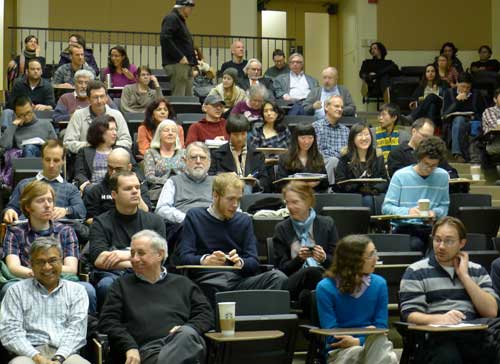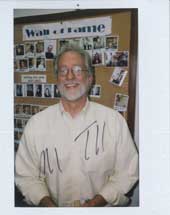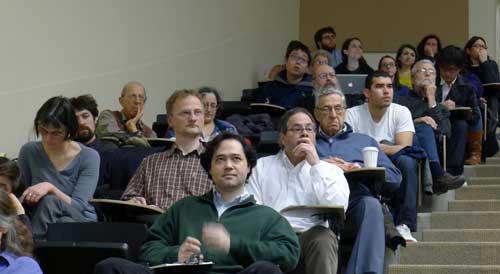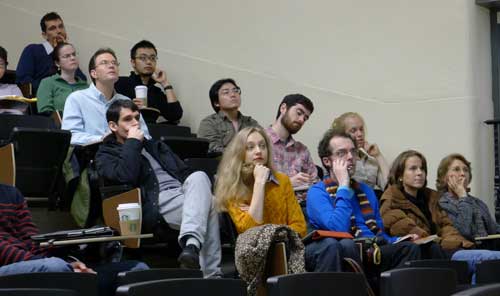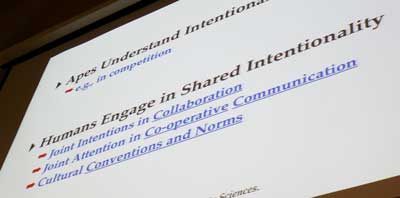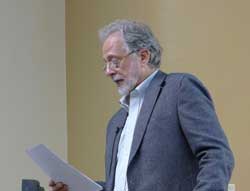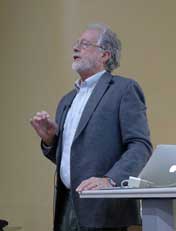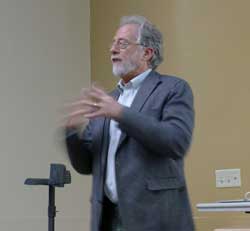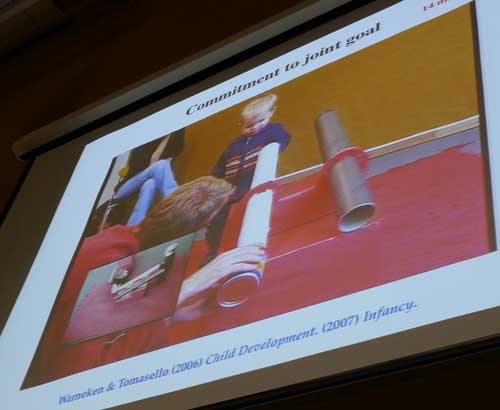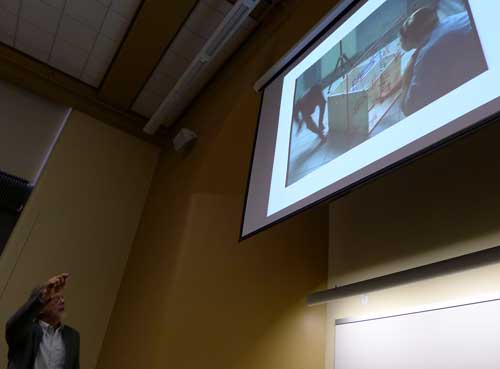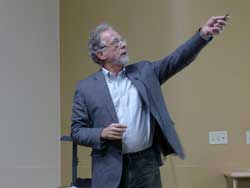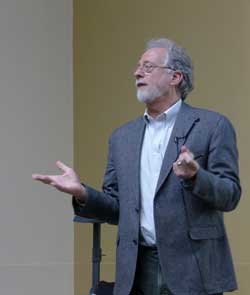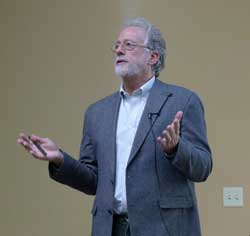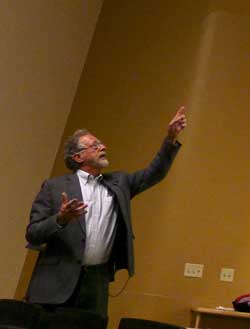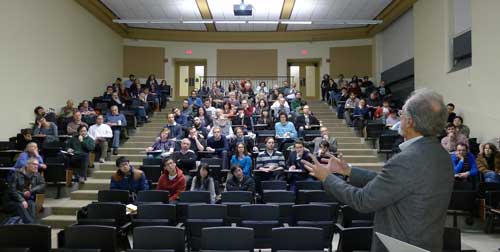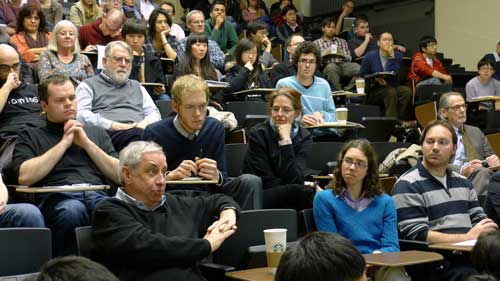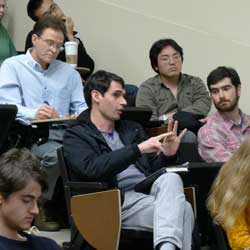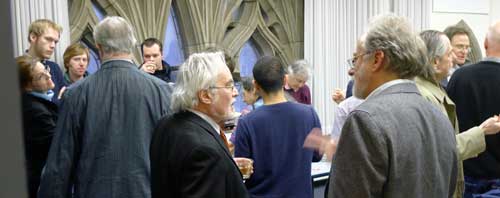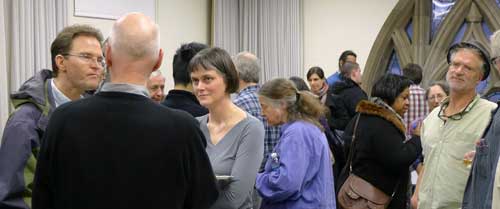

![]()
home
::: about
::: news
::: links
::: giving
::: contact
![]()
events
::: calendar
::: lunchtime
::: annual
lecture series
::: conferences
![]()
people
::: visiting fellows
::: postdoc fellows
::: resident fellows
::: associates
![]()
joining
::: visiting fellowships
::: postdoc fellowships
::: senior fellowships
::: resident fellowships
::: associateships
![]()
being here
::: visiting
::: the last donut
::: photo album
|
Experimenting with the Experimenters Michael Tomasello is a distinguished experimental psychologist who has been working for decades on human cognition. How is human cognition different from our nearest evolutionary neighbors, the other great apes? How did we come to these differences? Judging by his eminence and acclaim in the literature, his efforts have been quite fruitful. His Cultural Origins of Human Cognition won the William James Book Award of the American Psychological Association and has been translated into eleven languages. Even though he is an expatriate American, he was a founding co-Director of the prestigious Max Planck Institute for Evolutionary Anthropology in Leipzig. Philosophers of science like to think about thinking. It is a problem that is so immediate that we can scarcely avoid it. But that very immediacy corrupts the normal philosophical methods of reflective analysis. For we think we know a lot about our thinking from mere introspection. That would be dismissed as mere anecdotal evidence in any other investigation. I know I am a supremely rational decision maker, free from emotional distraction, because I watch myself doing it every day. I see it. Alas, anecdotal evidence is not saved merely by being more vivid. How can we get the distance needed? A new movement in philosophy has looked to experimental psychologists, just like Michael Tomasello. We hope that their methods, guided by test and control, will bring the objective distance needed. Hence it was with some excitement that our community learned from Bob Brandom that Michael Tomasello was interested in visiting in the Center. We were discovering an interesting symmetry. We philosophers feel that our analyses are incomplete because they lack the experimental component. He has begun to feel that his experimental investigations are incomplete because they lack the philosophical component.
Today it is Michael's turn to stand on the stage. He is to speak in our Annual Lecture Series. We guessed that he would draw a larger crowd than our regular room would hold. So we had shifted the proceedings to a larger room on the ground floor of the Cathedral of Learning. As the room filled, I was pleased that we had called this one correctly. When you organize, you never quite know what will happen. We have our share of missteps.
Michael's talk will lay out the basic discoveries of his research program. To get started, he carefully divides it into an empirical and a speculative part. The empirical part demonstrates that quite young human children have skills in shared intensionality that great apes lack. The speculative part is the conjecture that what is distinctive about human cognition derives from our participation in cooperative activities. They are, he said, "socially constituted." This idea, he noted, conformed with a venerable philosophical tradition and he named Hegel, Peirce and Wittgenstein. All this was passing by rather rapidly. I was scrambling to take notes so that I could fix the ideas in my head. It was philosophers' language of a type I didn't expect from an experimentalist. "Shared intensionality"? That's philosophers' talk for what happens when you and I see the spilled milk. We both know it means trouble; and you know that I know it; and I know that you know the very same thing. We can then go about cleaning up the mess. If you move the books out of the way of the spilled milk, I will go and get the paper towels to mop up the mess. That shared understanding is the key thing we humans have that other great apes lack. (Yes, novice that I am, I too had to look it up. I wasn't sure if "great ape" was a term of art or a term of derision. Great apes include chimpanzees, gorillas, orangutans and humans. So you can call your annoying uncle a "great ape" and merely be reporting an uncontroversial biological fact.)
We passed beyond that formal stage setting into his more normal delivery. It consists of short clips of children and chimps doing similar things; and a lively commentary on what we learn from them. We now moved from hard work to entertainment. A speaker cannot lose with 60 second movies of cute kids and monkeys. Our Sesame Street generation grew up on commercial length visuals. Michael presented a carefully selected series of experiments to build the components of his account. We started with a movie of a young child playing with an adult. The kid has a sense of collaborative play. That becomes clear when the adult perversely stops collaborating and messes up the game. The kid is visibly frustrated with the adult by the betrayal. An analogous game play with a chimp has the chimp troubled by the failure of the game. But the chimp does not identify the non-collaborating adult as the problem. The chimp lacked that shared understanding of the common goal of play. This was the first step of many. Soon we learn about pointing. A human child will recognize when an adult points to the hiding place of toy. The gesture of an outstretched adult's finger, by itself, is meaningless. To interpret it, the child recognizes a common ground with the adult: that the adult is trying to help the child find the toy. Corresponding experiments with chimps show them unable to recognize the pointing gesture as meaningful. They recover the hidden toy at chance levels only. This different is important. Recognizing pointing is a rudimentary form of symbolism. That this thing can stand for that one requires that we have a shared understanding in which agreement on its meaning is possible. Here's one more rather charming example of many. In play, the child agrees that this wooden play block is soap; and that one is a sandwich. An adult then has a hungry puppet happily eat the "soap." The child energetically corrects the adult. Here we see the emergence of a shared convention: we agreed that this block is soap and soap it must remain. It is just this sort of convention that grounds human institutions. A $20 banknote has value precisely because we all agree that those pieces of paper have value. The talk came to an end and Michael summed it up with a memorable thought experiment. If he was right, a human who somehow grew up on a desert island without other human contact would end up with the cognitive powers of a non-human great ape. Questions began. This was, it was clear, a room quite enthralled by the talk. But they wanted to press; and pressing revealed much more of interest. Why have chimps interacting with humans rather than other chimps in the experiments? It turns out that mother chimps will simply take food from their own babies. That precludes games in which food rewards the baby chimp. After the show was over and I began to think about writing these words, the incompleteness of my grasp became apparent to me. Michael had been cautious to a fault in making his points narrowly and precisely. His terminology was exact. The logician's "recursive" was used to describe what happens when I know what you are thinking. Walking toward the elevators with Al Janis, I found myself remarking to him: "Michael said exactly what he meant, but I don't know exactly what he said." The puzzles were forming in my thoughts. The connection between human cognition and cooperation was, I think, clearly established. But I was not so sure of the nature of the connection. Is it merely that there is an association between them now in modern humans? Or is it the stronger idea that one brings forth the other? Is it that the survival needs of our evolutionary forebears required cooperation and that in turn selected humans that happened to have cognition more like modern humans? Or might our forebears have developed more modern cognition through other evolutionary processes and the happy by-product was an enhanced ability to cooperate? If one of these is the idea, is comparison of children and chimps now sufficient to carry us back to the processes that led them to their ancestors' evolutionary divergence? Do our human brains have an innate capacity for cooperation, antecedent to any learning from our environment? Or do we learn it because our parents train us from the start? Can we close the gap to the big ideas of human cognition? How do we pass from pointing to a painting, from agreeing that this toy block is soap to the human institutions of commerce and law? Finally, what of the intriguing step to human language? A forty five minute talk can only gloss decades of research and these are all novice questions. Michael will be here for several months more and I can ask him these things directly. He may not in the end learn from us, but I am quite sure we will learn from him. John D. Norton |
